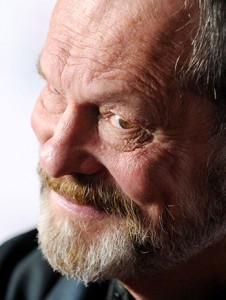 A couple of months back, Disc Dish spoke with filmmaker Terry Gilliam about his latest film, The Imaginarium of Doctor Parnassus (Sony DVD and Blu-ray street date: April 27), a fantastical morality tale set in modern-day London. Concerning the misadventures of a band of traveling performers led by an elder mystic and his magical mirror, the fantasy-filled world is a return to form of sorts for Gilliam, who co-authored its screenplay. It’s sad that the film will probably be best remembered as the one that star Heath Ledger was working on when he tragically died in January, 2008, but Gilliam’s dedication to the project—and how he dealt with the death of his leading man in the middle of filming—also deserve some serious attention.
A couple of months back, Disc Dish spoke with filmmaker Terry Gilliam about his latest film, The Imaginarium of Doctor Parnassus (Sony DVD and Blu-ray street date: April 27), a fantastical morality tale set in modern-day London. Concerning the misadventures of a band of traveling performers led by an elder mystic and his magical mirror, the fantasy-filled world is a return to form of sorts for Gilliam, who co-authored its screenplay. It’s sad that the film will probably be best remembered as the one that star Heath Ledger was working on when he tragically died in January, 2008, but Gilliam’s dedication to the project—and how he dealt with the death of his leading man in the middle of filming—also deserve some serious attention.
DD: Doctor Parnassus feels like it takes a lot from your earlier films—we’re thinking Time Bandits, Baron Munchausen, The Fisher King…
Gilliam: When you decide you’re going to write something original, where do you start? I’m such an egomaniac, I usually decide, ‘Let’s start with me!’ So you do that and you see where it goes. Whenever I’m adapting another book, it’s usually because it’s attractive to me—it’s about what I’m thinking of at the moment. And it grows, just like it does with originals. I kind of identify with all the characters in my movies, which is why I enjoy making them. If I let myself go down different directions, I learn a lot about myself. With Tideland, I discovered the child within me and it turned out to be a little girl, which is both a joke and not untrue.
DD: The tragic element of the Parnassus production story is obviously the death of Heath Ledger (pictured). After  making the decision to complete the film, were you energized in any special way?
making the decision to complete the film, were you energized in any special way?
Gilliam: No, I was completely de-energized! I just wanted to quit, actually. For the whole shoot afterward, we didn’t know if any of the things we were doing were going to work—I was on autopilot. What worried me was whether or not it was going to be good enough to be Heath’s last movie, which is a terrible responsibility. So you must move along and do one bit, and then the next bit and you so on. It wasn’t until we got back to London and put it together that we realized that it was actually going to work. It was a very strange experience and one that I hope I never have to go through again.
DD: How did you go about getting Johnny Depp, Jude Law and Colin Farrell to join the production?
Gilliam: The day after Heath died, I called Johnny just to commiserate because he was also close to Heath. I told him that I didn’t know what I wanted to do, but I think it’s over. Johnny said that whatever I decided to do, he would be there. Later, I found out that was the most crucial phone call I had ever made, because the money was disappearing—the reasonable, intelligent, experienced people and banks were pulling out. My [producer] daughter passed the phone call on, saying that I was talking to Johnny and that Johnny was going to help, and that stopped the retreat of the loot. But that didn’t solve the problem—I still had to figure out what to do and I then we came up with the idea of three actors taking over. I didn’t want one person taking over—three sounded like a likelier possibility. We started calling Heath’s friends and there were several other incredibly well-known actors who were willing to help but weren’t available. Johnny was the key at first—he was the one who was most likely to dragging in the audience with him–but it was proving very difficult to meet his schedule. At the very, very last moment, the film he was about to work on was delayed for one week, so he jumped in. We had him for one day, three-and-a-half hours, and then it was done. Jude and Colin came on quickly after that, but it’s ironic because we had talked to Jude about the part even before Heath took it. Colin says that he was channeling Heath as he was shooting it because Heath’s presence—a great spirit—was hanging over the whole thing.
DD: How did you modulate the film’s ratio of reality to fantasy?
Gilliam: My theory on all of it was, well, when you do these big fantasy films, within 10 minutes you’ve established this amazing fantasy. And then you’ve got to spend the next two hours maintaining that fantasy world—at great cost. And you simply get bored by it—within another 10 minutes, it’s a normal world. So I thought, why don’t we create a new world each time we go through the mirror, so that it’s always a surprise to the audience? So you get in there and then you get out before it gets too expensive. People think I’m a fantasist and all this bullshit, but they’re wrong–I am so fucking pragmatic. Really.